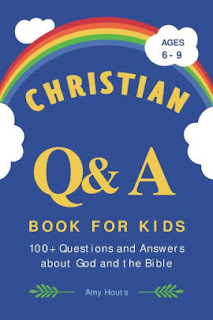Amy Houts uses simple, child-friendly language to answer each question, and includes a passage from the Bible to support each answer. The answers are fairly short—no more than one page each, printed in a large font—and easy to understand. Though there are a few answers that come across a bit like textbook entries (see “What is Christianity?” and “Is Christianity like other religions?” on pages 48 and 49, for example), for the most part the book reads like a series of personal notes. That, and the short entries, make this book accessible even for a more reluctant reader.
CHRISTIAN Q & A BOOK FOR KIDS is written to be inclusive of a wide range of Christian beliefs so that children of any Christian background (Catholic, Protestant, and of varying denominations) can get answers to their questions. I think that’s a worthy goal, and mostly successful. However, because of this book’s inclusive nature, some of the answers seem a bit flimsy and at times even contradictory.
For example, on page 47, the question is “Will my friend who doesn’t believe in Jesus go to heaven?” Houts answers in part that “your friend’s salvation is up to them,” but then later says that “A loving God will show compassion to your friend.” These two statements seem to contradict each other, though admittedly the latter is a bit ambiguous. Also, the Bible passage referenced, John 12:47, is taken out of context. In that verse, Jesus says:
“If anyone hears my words but does not keep them, I do not judge that person. For I did not come to judge the world, but to save the world.”
But Jesus continues in verse 48:
“There is a judge for the one who rejects me and does not accept my words; the very words I have spoken will condemn them at the last day.”
I think that by treading too carefully with this answer, Houts gets it wrong. A basic tenet of the Christian faith is that Jesus is the only way to get to Heaven. The Bible says about Jesus in John 3:16 that “whoever believes in him shall not perish but have eternal life.” And John 14:6 says, “Jesus answered, ‘I am the way, the truth and the life. No one comes to the father except through me.’”
Later in the book, Houts says, “Believe in Jesus, and you will be saved,” (page 53). Agreed! A better answer to the unbelieving friend question may have been: Your friend may not believe in Jesus now, but could come to believe in him because of your Christian example and prayer. Don’t despair! The Bible says in 1 Peter 3:9, “The Lord is not slow in keeping his promise, as some understand slowness. Instead he is patient with you, not wanting anyone to perish, but everyone to come to repentance.”
The question of salvation is THE foundational question of Christianity. Without the foundation of faith in Jesus Christ and his resurrection, everything else about Christianity becomes just a good way to live.
There is another key answer in the book with which I disagree. On page 24, Houts writes that Jesus had “human parents: a mother named Mary and a father named Joseph.” This implies that Jesus was conceived in the ordinary way, but Scripture tells us he was born of a virgin. This is another important core belief of Christianity. There is an opportunity for Houts to clarify this later in the answer to the question, “Did Jesus’s mother know He was God’s son?” (page 27), but she does not address it.
There are a few other points on which Houts and I disagree:
- The most important thing Jesus taught (page 36) is not that we love each other, but that we love God and our neighbor (see Matthew 22:34-40). Though, the answer to the question “What did Jesus say was the most important commandment?” (page 85) addresses this. These two questions could have been combined into one.
- The answer to the question, “Is Christianity like other religions?” implies that it doesn’t matter what religion you are. But it does!
- I believe being “born again” (page 54) is not a renewal of faith or a form of baptism, but the salvation experience itself, spiritual rebirth, aka being “saved” (page 53).
- The answer for “What is Hell?” could have been more definitive (eternal separation from God) without fussing about specifics (where it is and whether Satan gets to punish people).
- I’ve personally never heard of the belief that Jesus was laid in a manger as a symbol for him being food for our spirits (page 103). I believe that his lowly birth was the beginning of a life of humility, complete surrender to the Father, and service to those he came to save (see Matthew 20:28).


No comments:
Post a Comment
I would love to hear from you!